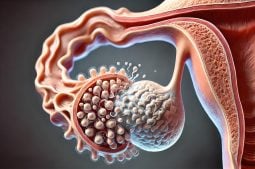

Before deciding to preserve your fertility, it’s essential to understand what fertility preservation entails. How long can eggs remain frozen? Which is the ideal age to undergo the process? Fertility preservation becomes particularly relevant when reproductive health cannot wait, and professional or personal development takes priority—whether individually or as a couple. In this blog, we… View Article

Fertility preservation has become increasingly significant in a society where having children is not always possible at the desired time. When reproductive health cannot wait and professional development is a priority, medical advancements allow individuals to choose the right moment to start a family. At IVI, we are taking a step forward in oocyte vitrification… View Article

Diet pills are a popular choice for some women who are thinking about becoming pregnant while maintaining physical activity during pregnancy, or for those planning to conceive. Consequently, they opt to combine their daily exercise routine with weight loss pills. How safe is it to take these medications? In this blog, we’ll explain everything you… View Article

Does Ozempic affect fertility? Ozempic has gained significant popularity in recent years for its effectiveness in treating type 2 diabetes and, more recently, as a weight loss option. Its active ingredient, semaglutide, is a GLP-1 (glucagon-like peptide-1) analog, a hormone that regulates blood sugar and influences appetite control. While widely used for these purposes, many… View Article

An antral follicle is the final stage of development of the primordial follicles that are already present in the ovaries of baby girls when they are born. Too miniscule to be seen by the naked eye, there are roughly one million at birth, and these are all the potential eggs a woman is ever going to have…. View Article

Egg white vaginal discharge: what does it mean? Your cervical mucus, or discharge, changes throughout the menstrual cycle. It is a very good indicator, for those who know how to interpret the signs, of where you are in your cycle. It also shows when are you about to ovulate and whether you are therefore at… View Article

Does TRT make you infertile? Testosterone Replacement Therapy (TRT) emerges as a treatment option to restore normal testosterone levels. Testosterone is a key hormone for the development and maintenance of several bodily functions, particularly in men. Over time, or due to certain health issues, testosterone levels may decline. This leads to various symptoms and problems… View Article

Fertility Boosting Foods can be an optimal way to increase your chances of becoming pregnant. Numerous studies indicate that women with overweight or obesity face greater challenges in conceiving, both naturally and through assisted reproductive treatments. Similarly, it has been demonstrated that women with a BMI above 25 experience higher miscarriage rates. Obesity and overweight negatively… View Article

One of the most common questions that arises for people who experienced infertility or reduced fertility is concerned with the use of fertility drugs. What drugs are available, are they effective and are there any dangers and side effects? The answers to these questions fall mainly into two different areas: ‘standalone’ drugs, i.e. those which… View Article

The embryo transfer is one of the most exciting and anticipated moments during fertility treatment. After the procedure, many women wonder if they can resume their normal daily activities, with one of the most common concerns being whether it is safe to travel during this delicate period. This article explores whether it is possible to… View Article
